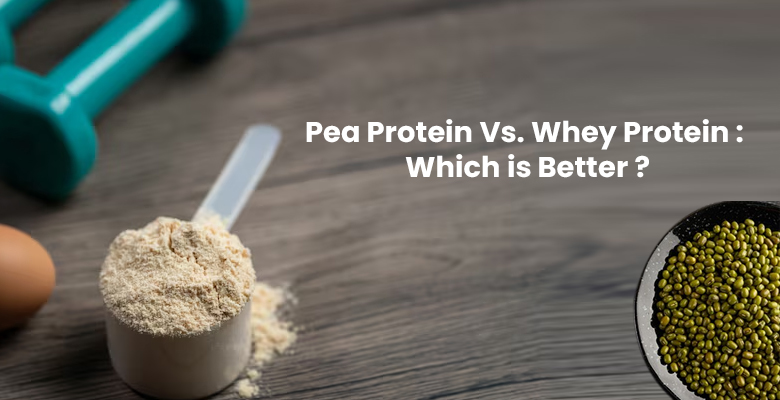
Protein supplements are becoming increasingly popular with fitness lovers, bodybuilders/athletes (professional or in the making) because of their possible benefits. Regarding some of the protein supplements, two of the most widely known are pea protein and whey. This article takes an in-depth look at both proteins, including their nutritional profiles, benefits, and downsides. Read the entire piece and find out which is better Pea Protein or Whey Protein.
Understanding Pea Protein
What is Pea Protein?
Pea Protein is a high-quality source of plant-based protein made from yellow peas. It is produced by isolating the protein content from peas and is commonly used in vegan and vegetarian diets.
Pea Protein Nutritional Profile
Pea protein has a high level of essential amino acids, such as arginine, lysine, and phenylalanine. One scoop or about 30 grams of pea protein powder contains around
- Calories- 120
- Protein- 21 grams
- Carbohydrates- 1 gram
- Fat- 2 grams
- Fiber- 5 grams
- Iron- 5 mg (28% of the RDI)
Pea Protein Benefits
- Hypoallergenic- Pea protein is dairy, soy, and gluten-free making it perfect for those with allergies or intolerances.
- Digestive friendly- Easy to digest and doesn’t cause bloating or discomfort in most people.
- Iron-rich- Pea protein is a good source of iron providing a big chunk of your daily recommended intake.
- Sustainable- Peas are a sustainable crop that requires less water and resources than dairy farming.
Pea Protein Downsides
- Incomplete Protein- Pea protein is not a complete protein as it is low in methionine. But you can fix that by combining it with other protein sources.
- Taste and Texture- Some people don’t like the taste and texture of pea protein as much as whey protein.
What is Whey Protein
Whey is a byproduct of cheese. It’s a high-quality, complete protein with all 9 essential amino acids. Whey is available in 3 forms- concentrate, isolate, and hydrolysate.
Whey Protein Nutritional Profile
Nutrition will vary depending on the form but one scoop (30g) of whey protein isolate will contain:
- Calories- 120
- Protein- 25g
- Carbs- 2g
- Fat- 1g
- Calcium- 160mg (13% RDI)
Benefits of Whey Protein
- Complete Protein- Whey protein contains all essential amino acids, making it a complete protein.
- High Leucine Content- It is rich in leucine, an amino acid critical for muscle protein synthesis.
- Fast Absorption- Whey protein is quickly absorbed by the body, making it ideal for post-workout recovery.
- Muscle Mass and Strength- Studies have shown that whey protein supplementation can enhance muscle mass and strength when combined with resistance training.
Cons of Whey Protein
The drawbacks are mentioned in the points below
- Whey protein has lactose; thus, it can be digested more than the others for lactose intolerant people.
- Some people might experience bloating, gas, or other abdominal discomforts
- Dairy farming pollutes the environment at a much higher rate when compared to other sources of plant proteins.
Comparing Pea Protein and Whey Protein
Pea Protein- This makes it slightly lacking in methionine, although pea protein has many important amino acids. You can also combine pea protein powder with another type of powder for example rice protein powder so that both types complement each other and form a complete protein package.
Whey Protein- Unlike other proteins like pea ones, which contain lesser amino acids such as methionine, whey protein contains all essential amino acids especially much leucine necessary for muscle building.
Digestibility
Pea protein is easy to digest and is supposed to be suitable for people with certain dietary limitations. While whey protein is quickly absorbed, it may lead to stomach upset in those who are intolerant to lactose.
Taste and Texture
Pea protein sometimes has an earth-like flavor and sandy consistency that discourages some people. Being creamy and less flavoured, whey protein is a common choice, particularly in flavored forms.
Cost
Pea Protein- Generally, it is more affordable compared to whey protein, especially organic and high-quality whey isolates.
Whey Protein- This can be more expensive, particularly whey isolates and hydrolysates.
Conclusion
The choice between pea protein and whey protein depends on individual preferences, dietary restrictions and choices, and specific health goals.
Pea Protein- Ideal for those with allergies, lactose intolerance, or those following a vegan or vegetarian diet. It offers a protein source that is easy to digest.
Whey Protein- Best suited for individuals looking for a complete protein source for muscle growth and quick recovery post-exercise. However, it may not be suitable for those with lactose intolerance or dairy allergies.
Both pea protein and whey protein have their unique benefits and potential drawbacks too. You need to identify your preferences before making your decision. You can buy any of the protein powder that you like from Amazon.
